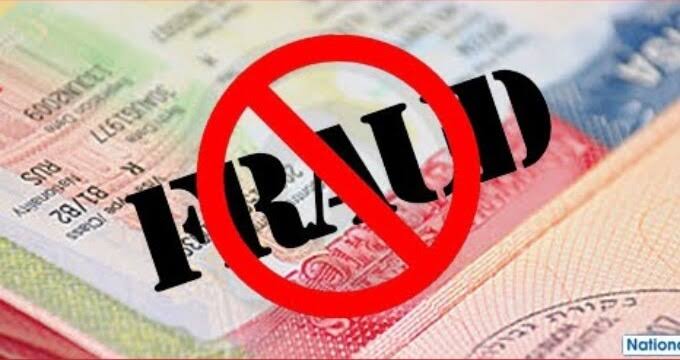The Scope of Visa Fraud
Visa fraud encompasses a wide range of deceptive practices designed to circumvent immigration laws. These practices can include:
- Document Forgery: Producing fake passports, visas, or other essential travel documents.
- Misrepresentation: Providing false information on visa applications, such as fake employment details or fabricated travel histories.
- Visa Overstays: Entering a country legally but remaining beyond the authorized period.
- Fraudulent Sponsorship: Utilizing fake employers or family relationships to secure visas.
- Human Trafficking and Smuggling: Exploiting visa systems to transport individuals illegally for labor or sexual exploitation.
Common Tactics Used by Visa Fraudsters
Fraudsters employ a variety of tactics to deceive immigration authorities and unsuspecting individuals:
- Fake Websites and Agencies: Fraudulent visa services and websites that mimic official government sites or legitimate agencies, often promising guaranteed visas for a fee.
- Phishing Scams: Sending emails or messages that appear to be from immigration authorities, requesting personal information or payment for visa processing.
- Document Mills: Operations that produce high-quality counterfeit documents to support fraudulent visa applications.
- Job Offer Scams: Offering fake employment opportunities that require the victim to pay for visa processing and other upfront costs.
- Travel Agency Scams: Unregistered or fraudulent travel agencies that collect money for visas and travel arrangements but disappear without delivering services.
Impact of Visa Fraud
The consequences of visa fraud are far-reaching and can affect individuals, businesses, and governments:
- National Security Risks: Fraudulent visa entries can allow criminals, terrorists, and other threats to infiltrate a country.
- Economic Impact: Visa fraud can lead to increased costs for businesses and governments, including the costs of investigating and prosecuting fraud cases.
- Personal Harm: Victims of visa fraud may face financial loss, legal consequences, and emotional distress. In cases of human trafficking, individuals may suffer severe exploitation and abuse.
- Reputation Damage: Countries known for high levels of visa fraud may face reputational damage, affecting their international standing and relations.
Taking Precautions Against Visa Fraud
To protect oneself from visa fraud, individuals can take several precautionary steps:
- Verify Sources: Always verify the authenticity of the website or agency offering visa services. Official government websites usually have domain extensions like “.gov” or “.gov.[country code]”.
- Use Authorized Channels: Apply for visas through authorized government channels or accredited agencies. Avoid third-party agents who promise guaranteed visas.
- Be Cautious with Personal Information: Do not share personal information or make payments unless you are sure of the legitimacy of the request.
- Educate Yourself: Stay informed about common visa scams and the latest fraud tactics. Knowledge is a powerful tool in preventing fraud.
- Consult Official Sources: If in doubt, consult the embassy or consulate of the country you wish to visit. They can provide accurate information on the visa application process.
Recognizing Red Flags
Being aware of common warning signs can help individuals recognize and avoid visa fraud:
- Unsolicited Offers: Be cautious of unsolicited job offers or visa services that come via email or social media.
- High Fees and Urgency: Scammers often pressure victims to pay high fees quickly, claiming that immediate action is required.
- Too Good to Be True: Offers that seem too good to be true, such as guaranteed visas without any eligibility requirements, are likely fraudulent.
- Lack of Contact Information: Legitimate agencies and services will provide clear contact information and be reachable through multiple channels.
- Poor Language and Design: Many scam websites and emails contain spelling and grammatical errors or have poorly designed interfaces.
Reporting Visa Fraud
If you suspect visa fraud, it is crucial to report it to the appropriate authorities:
- Government Agencies: Contact the immigration department or relevant government agency in your country.
- Embassies and Consulates: Inform the embassy or consulate of the country whose visa is being targeted by the fraud.
- Local Law Enforcement: Report the fraud to local police if you have been a victim.
- Online Reporting: Many countries have online portals for reporting fraud and scams. Use these platforms to provide detailed information about the suspected fraud.
Protecting Businesses from Visa Fraud
Businesses that sponsor visas or hire international employees can also take steps to prevent visa fraud:
- Conduct Thorough Vetting: Implement rigorous vetting processes for job candidates, including background checks and verification of credentials.
- Partner with Reputable Agencies: Work with reputable immigration lawyers and agencies for visa processing and compliance.
- Educate Employees: Train HR and recruitment teams to recognize signs of visa fraud and understand legal obligations.
- Maintain Records: Keep detailed records of all visa applications, supporting documents, and communications to ensure transparency and accountability.
- Stay Updated: Regularly review immigration laws and regulations to ensure compliance and adjust policies as needed.
Conclusion
Visa fraud is a pervasive issue that requires vigilance and proactive measures from individuals, businesses, and governments. By understanding the tactics used by fraudsters and taking steps to verify sources, protect personal information, and recognize red flags, individuals can safeguard themselves against visa scams. Additionally, businesses must implement robust vetting and compliance processes to prevent fraudulent activities and maintain the integrity of their operations.
As the methods used by fraudsters continue to evolve, staying informed and adopting best practices will be essential in combating visa fraud. By working together, we can protect the integrity of immigration systems and ensure that the opportunities provided by legitimate visa programs are accessible to those who genuinely qualify.



Nice article